Signs of Low Testosterone: Know the Warning Signs & Act!

Your testosterone levels are the backbone of your physical and mental performance. When this vital hormone drops, your body sends distress signals-ignoring them could mean surrendering your edge. Nearly 40% of men over 45 experience declining T-levels, but many dismiss the symptoms as normal aging.
This isn’t just about libido. Low testosterone weakens muscle mass, bone density, and even cognitive sharpness. Fatigue, mood swings, and stubborn weight gain are your body’s way of declaring a Code Red. Early detection is your best defense-before full-system breakdowns occur.
Arm yourself with knowledge. Recognize the red flags, from dwindling energy to erectile struggles. Your mission: health restoration. Let’s identify the threats and strategize your counterattack.
Key Takeaways
- Testosterone decline affects 40% of men over 45, impacting energy and performance.
- Low T-levels weaken muscles, bones, and mental clarity-not just sexual health.
- Fatigue, mood changes, and weight gain are critical warning signs.
- Early action prevents long-term physical and cognitive decline.
- Knowledge and proactive measures are your strongest allies.
Signs of Low Testosterone: Key Symptoms to Watch For
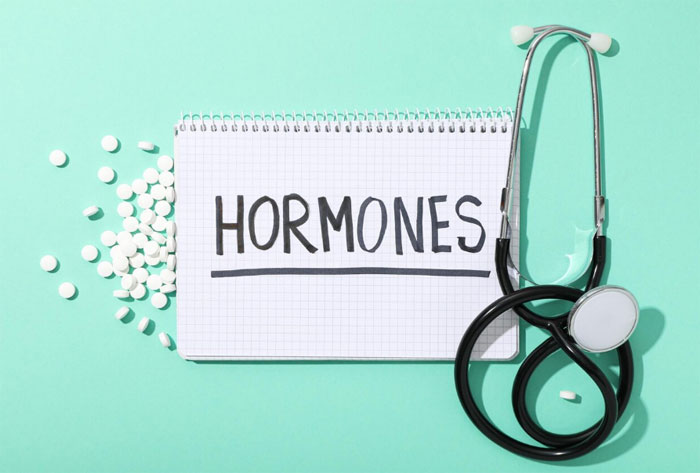
Declining hormone levels trigger unmistakable red flags in your system. Ignoring them risks long-term damage to your body, from weakened muscle mass to emotional instability. Here’s your recon report on the frontline symptoms.
Reduced Sex Drive and Erectile Dysfunction
A dwindling sex drive is often the first casualty. When T-levels drop, 35% of men experience erectile dysfunction-your body’s equivalent of a failed mission. Performance anxiety isn’t the enemy here; hormonal imbalance is.
Physical Changes: Hair Loss, Gynecomastia, and More
Your hair retreats from battlefields like your chest and scalp. Meanwhile, gynecomastia (enlarged breast tissue) advances. Fat storage spikes, and muscle definition fades-your physique surrenders to hormonal sabotage.
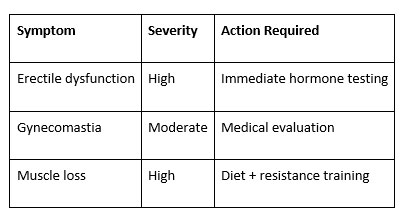
Mood and Cognitive Effects
Depression trenches and memory lapses signal a mental fog-of-war. Studies link low T to a 25% higher anemia risk, starving your brain of oxygen. Hot flashes? They’re your body’s SOS flares at critical hormone depletion.
- Red Flag 1: Libido nosedives and erectile missions fail.
- Red Flag 2: Hair deserts, fat camps occupy your midsection.
- Red Flag 3: Mood swings detonate like emotional IEDs.
What Causes Low Testosterone?

Testosterone production faces sabotage from three battlefronts: biological, structural, and lifestyle. Your hormone levels don’t crash without a fight-identify the enemies to mount a defense.
Primary Hypogonadism: Testicular Disorders
Your testicles are command HQ for T-production. When they’re compromised, the mission fails. Klinefelter’s syndrome (an extra X chromosome) weakens sperm development. Undescended testicles from birth reduce function by 50%.
Chemotherapy and radiation are scorched-earth tactics-80% of survivors suffer testicular damage. Even viral sleeper cells like mumps can detonate years later, destroying tissue.
Secondary Hypogonadism: Pituitary or Hypothalamus Issues
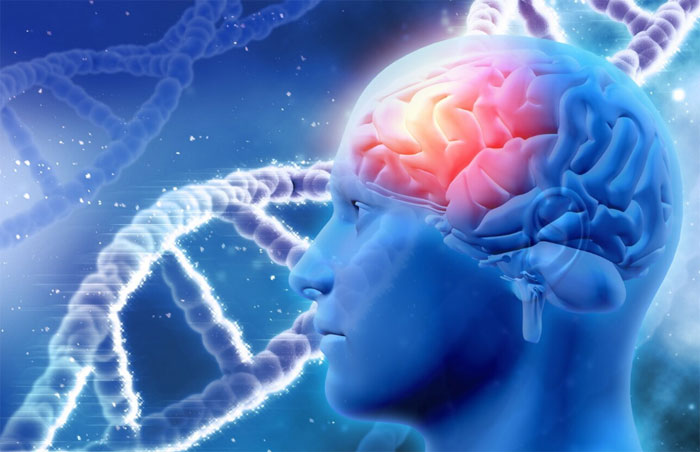
Your brain’s gland network (pituitary/hypothalamus) relays orders to the testicles. Trauma, tumors, or Kallmann syndrome disrupt this chain of command. Without signals, hormone production halts.
Diabetes is a silent saboteur-25% of diabetic men have T-deficiency versus 13% of non-diabetics. The gland’s intelligence network flatlines.
Lifestyle and Environmental Factors
Obesity is a traitor within your ranks. Overweight men are 300% more likely to develop hypogonadism. Fat cells convert testosterone into estrogen-a hormonal mutiny.
- Alcohol and opioids: These double agents suppress hormone synthesis.
- Stress: Cortisol floods the trenches, blocking T-production.
- Sleep deprivation: Your body’s nightly repair ops get ambushed.
Arm yourself with intel. Every cause has a counterstrategy-starting with identifying the breach.
How Low Testosterone Affects Different Age Groups
From teenage recruits to seasoned veterans, low T wages a silent war on every front. Your body’s response depends on age-whether you’re in puberty’s trenches or navigating midlife’s battlefield. Recognize the threats specific to your stage of life to mount a counterattack.
Younger Men and Adolescents: A Critical Development Phase
For teens, low T is like a failed boot camp-stunted height, voice cracks, and underdeveloped muscle mass. Pre-puberty hormone deficiency causes uneven limb growth, sabotaging physical development permanently.
Sperm production may never fully activate if T-levels crash during these critical years. By age 20, 15% of men with untreated adolescent deficiencies face irreversible fertility issues.
Older Men: The Gradual Siege on Vitality
After 30, T-levels drop 1% yearly-a slow bleed weakening your armor. Bone density erodes, memory falters, and energy supply lines fray. By 50, 60% of cases go undiagnosed despite 4x higher risk.
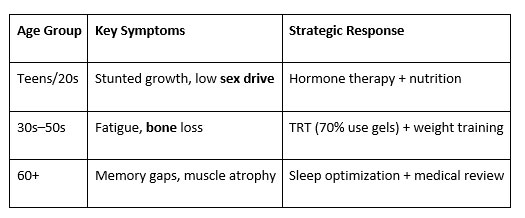
Your mission: Adapt strategies to your age. Younger troops need rapid intervention-older warriors require sustained defense. Never surrender to the silent advance.
Diagnosing Low Testosterone: Tests and Procedures
Uncovering low T requires precision intel-your diagnostic mission starts here. Lab tests and scans are your recon tools to expose hidden hormone deficiencies. Without accurate diagnosis, you’re fighting blind.
Blood Tests and Hormone Levels
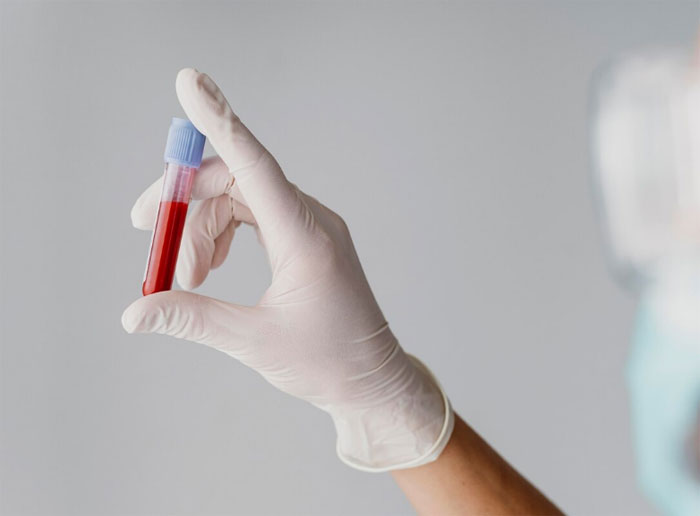
Your first strike: blood work. Total testosterone (450–600 ng/dL is optimal) and free T levels are measured. DEFCON alert if results drop below 300 ng/dL.
Morning draws are critical-T peaks at dawn. LH/FSH levels reveal if the issue is testicular (primary hypogonadism) or brain-driven (secondary). Three tests minimum eliminate false alarms.
Additional Diagnostic Tools
Advanced surveillance includes MRI scans for pituitary tumors and semen analysis for sperm counts. Physical recon checks testicle size and rules out prostate cancer before TRT deployment.
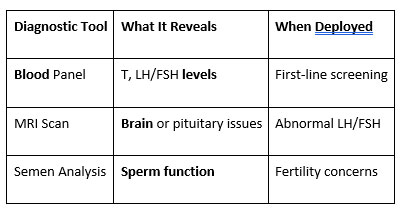
- Critical Intel: Morning blood tests capture peak T levels.
- Red Flag: LH levels above 10 mIU/mL signal testicular failure.
- Rule Out: Prostate exams before TRT-safety first.
Treatment Options for Low Testosterone
Combat low T with strategic treatments that restore your hormonal firepower. Whether you enlist medical reinforcements or natural protocols, your mission is clear: reclaim peak testosterone levels. Here’s your tactical playbook.
Testosterone Replacement Therapy (TRT)
TRT is your frontline defense. Gels dominate 70% of therapy plans-applied daily for steady hormone delivery. Injections strike fast but require biweekly deployments. Pellet implants offer 3–6 months of covert support.
Warning: TRT is a lifelong campaign. Abandoning treatment triggers a testosterone collapse. Regular blood work ensures optimal levels.
.jpg)
Lifestyle Changes and Natural Remedies

Fortify your body with these non-pharmaceutical tactics:
- Zinc and Vitamin D: 40% of deficiencies sabotage production. Supplement or consume oysters, eggs, and sunlight.
- Weight training: Lifting heavy boosts T by 20% in 6 months. Prioritize squats and deadlifts.
- Sleep discipline: Less than 7 hours crashes hormone output. Secure your 8-hour perimeter.
Obesity is your enemy. Shedding fat can spike T by 50%. Eliminate sugar landmines and alcohol-they’re double agents.
Risks and Complications of Untreated Low Testosterone
Low T doesn’t negotiate. It sabotages your bones, brain, and resilience-silently but ruthlessly. Left unchecked, the effects escalate from fatigue to full-system rebellion. Your mission: fortify defenses before the damage becomes irreversible.
Long-Term Health Impacts
Your skeletal system bears the brunt. Untreated hormone deficiency hikes osteoporosis risk 5x-your bone density retreats like a crumbling frontline. Prostate complications advance, with studies linking low T to higher cancer surveillance needs.
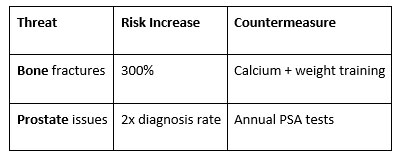
Mental and Emotional Consequences
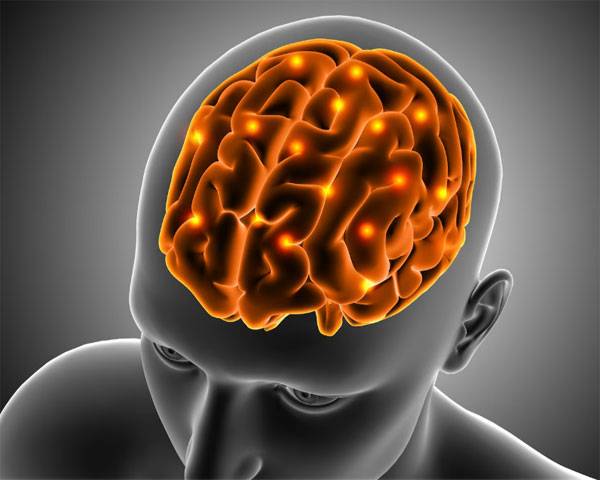
Your brain operates in a fog. Depression rates triple, and memory loss creeps in like a covert operative. Relationships fracture under the strain-60% of men report emotional withdrawal within 5 years.
- Code Red: 25% higher anemia risk starves your cells of oxygen.
- Psychological Warfare: Anxiety and self-esteem plummet.
- Systemic Collapse: Cardiovascular efficiency drops by 15%.
This isn’t just about health-it’s about survival. Deploy countermeasures now, or surrender ground to irreversible effects.
Conclusion: Taking Control of Your Health
Victory starts with awareness-your health mission isn’t over yet. Nearly 40% of men over 45 face hormonal depletion, but silence is surrender. Report for bloodwork recon at dawn. Your testosterone levels dictate your combat readiness.
Armor up with treatment reinforcements-TRT or lifestyle discipline. Optimal therapy isn’t a retreat; it’s a strategic advance. Share this intel with three brothers-in-arms. Together, you hold the line.
Final briefing: Your life’s missions demand peak performance. Deploy knowledge. Secure victory.
FAQ
What are the most common signs of low testosterone?
You might notice a drop in sex drive, erectile dysfunction, fatigue, muscle loss, and mood swings. These symptoms often creep in slowly but can seriously impact your daily life.
Can younger men experience low testosterone?
Absolutely. While it’s more common in older men, younger guys can face it due to injuries, infections, or conditions like Klinefelter syndrome. Don’t ignore the warning signs-early action matters.
How is low testosterone diagnosed?
A simple blood test checks your hormone levels. Your doctor may also review symptoms and run additional tests to pinpoint the cause.
What causes low testosterone?
It can stem from testicular damage, pituitary disorders, chronic illnesses, or even poor lifestyle choices like obesity and excessive alcohol use.
Is testosterone replacement therapy (TRT) safe?
TRT can be effective but isn’t for everyone. Risks include blood clots and prostate issues. Always consult a doctor to weigh the pros and cons.
Can lifestyle changes boost testosterone naturally?
Yes! Strength training, a balanced diet, quality sleep, and stress management can help. Small changes today lead to big gains tomorrow.
What happens if low testosterone goes untreated?
Left unchecked, it can lead to bone loss, depression, and increased risk of heart disease. Don’t wait-take charge of your health now.





